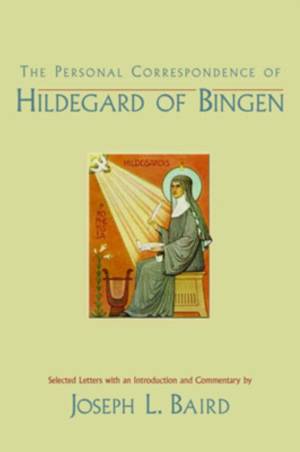
- Retrait gratuit dans votre magasin Club
- 7.000.000 titres dans notre catalogue
- Payer en toute sécurité
- Toujours un magasin près de chez vous
- Retrait gratuit dans votre magasin Club
- 7.000.0000 titres dans notre catalogue
- Payer en toute sécurité
- Toujours un magasin près de chez vous
Description
Hildegard of Bingen (1098-1179) was one of the most remarkable women of her day. From early childhood she experienced religious visions, and at the age of eight she entered a cloistered religious life in the Benedictine monastery of Disibondenberg. Eventually she not only became abbess of the community, but presided over the establishment of an important new convent near Bingen. All but forgotten for hundreds of years, Hildegard was rediscovered in the 1980s and since then her visionary writings have been widely read and studied. Even more surprisingly, music that she composed has been performed and recorded to great acclaim. She has come to be seen by some as a proto-feminist icon -- a woman of great accomplishments who made her own way in a man's world and exerted extraordinary influence over some of the most powerful figures of her time. Much of Hildegard's correspondence has been preserved. It reveals that for more than 30 years this cloistered nun was an unflinching adviser and correspondent to all levels of church and society, from popes and kings to ordinary lay persons, from Jerusalem to England. With the 2004 OUP publication of Volume III of Joseph Baird and Radd Ehrman's translation, the complete correspondence became available for the first time in English. For this new abridgement, Baird has selected 75 of the most interesting and revealing of the letters from Volumes I, II, and III. Freed from the organizational restraints of the Latin edition of the letters, he has arranged them in roughly chronological order and provided greatly expanded, accessibly written introductory notes that contextualize the letters and explain their significance. As a result, this fascinating collection serves as a kind of life in letters that makes an ideal introduction ot this exceptional woman, her world, and her work. This book is the first to give a thorough and definitive illlumination of the personal life of Hildegard of Bingen as viewed through the defining lens of her personal correspondence: her early, hesitant bid for recognition of her spiritual gifts; her courageous, and ultimately futile, fight to retain the companionship of her close personal friend and the poignant outcome of that struggle; her vehement defiance of the male hierarchy in her bid to establish her own communities under her personal governance; her impudent challenge to contemporary conservatives views by the dress and customs she established in her community; her paean of praise for the power of music; and her adamant refusal, even at the advanced age of eighty, to give in to the demands of the male authorities even in the face of excommunication.
Spécifications
Parties prenantes
- Auteur(s) :
- Editeur:
Contenu
- Nombre de pages :
- 208
- Langue:
- Anglais
- Collection :
Caractéristiques
- EAN:
- 9780195308235
- Date de parution :
- 07-09-06
- Format:
- Livre broché
- Format numérique:
- Trade paperback (VS)
- Dimensions :
- 140 mm x 211 mm
- Poids :
- 263 g

Les avis
Nous publions uniquement les avis qui respectent les conditions requises. Consultez nos conditions pour les avis.






